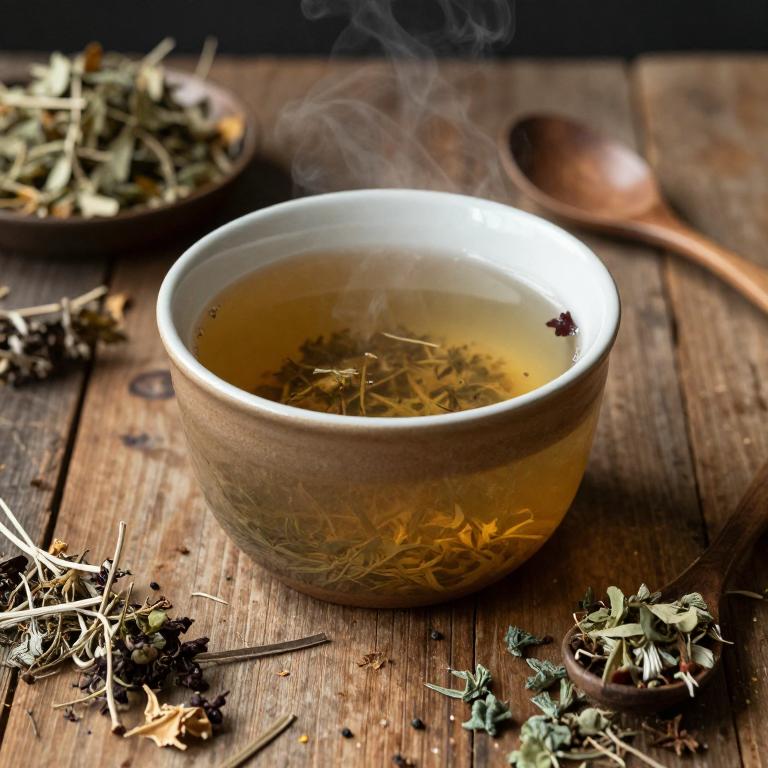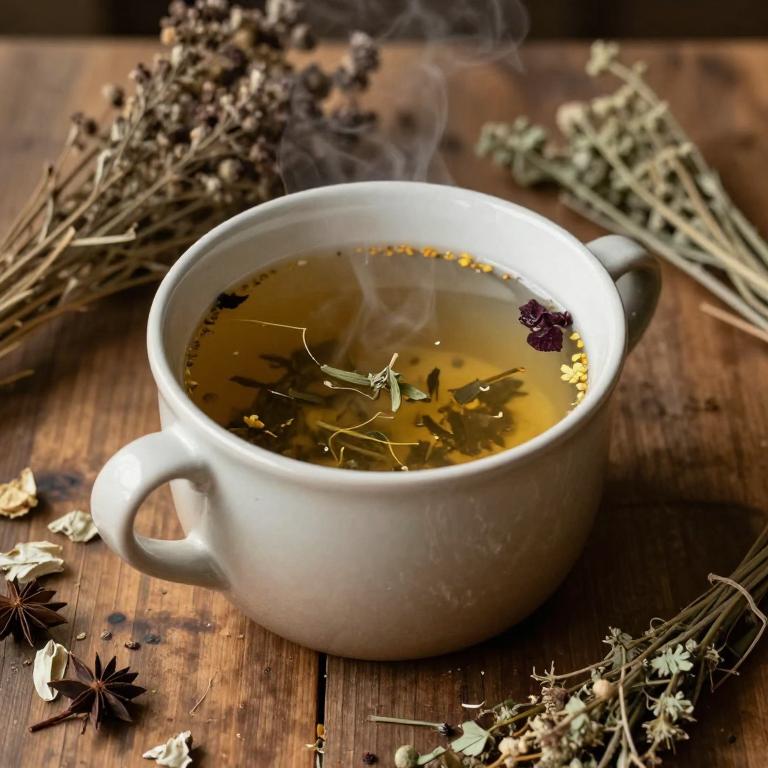10 Best Herbal Decoctions For Ear Blockage

Herbal decoctions have been traditionally used to alleviate ear blockage by promoting drainage and reducing inflammation.
Common herbs such as garlic, ginger, and eucalyptus are often included for their antimicrobial and decongestant properties. To prepare a decoction, these herbs are boiled in water for several minutes, then strained and cooled before use. Some people apply the warm liquid directly to the ear or use it as a nasal rinse to help clear the Eustachian tubes.
While these remedies may provide relief for mild cases, they should not replace professional medical advice, especially if symptoms persist or worsen.
Table of Contents
- 1. Salvia (Salvia officinalis)
- 2. Ginger (Zingiber officinale)
- 3. Rosemary (Rosmarinus officinalis)
- 4. Yarrow (Achillea millefolium)
- 5. Black pepper (Piper nigrum)
- 6. St. john's wort (Hypericum perforatum)
- 7. Peppermint (Mentha piperita)
- 8. Eucalyptus (Eucalyptus globulus)
- 9. Garlic (Allium sativum)
- 10. Stinging nettle (Urtica dioica)
1. Salvia (Salvia officinalis)

Salvia officinalis, commonly known as sage, has been traditionally used in herbal medicine for its potential therapeutic properties.
When prepared as a decoction, sage can be used to address ear blockage by reducing inflammation and promoting drainage. The essential oils in sage, such as thujone and camphor, may help soothe the ear canal and alleviate discomfort. However, it is important to consult a healthcare professional before using sage decoctions, as improper use can lead to irritation or other complications.
While some anecdotal evidence supports its use, scientific research on sage's effectiveness for ear blockage remains limited.
2. Ginger (Zingiber officinale)

Zingiber officinale, commonly known as ginger, has been traditionally used in herbal medicine for its anti-inflammatory and circulatory benefits.
When prepared as a decoction, ginger can help alleviate ear blockage by reducing inflammation in the Eustachian tubes and improving blood flow to the ear area. The active compounds in ginger, such as gingerol and shogaol, possess antimicrobial and analgesic properties that may contribute to its effectiveness in relieving ear discomfort. To prepare the decoction, fresh ginger root is sliced and simmered in water for about 15-20 minutes, then strained and consumed warm.
While some individuals may find relief from this natural remedy, it is advisable to consult a healthcare professional if symptoms persist or worsen, as persistent ear blockage can indicate a more serious underlying condition.
3. Rosemary (Rosmarinus officinalis)

Rosmarinus officinalis, commonly known as rosemary, has been traditionally used in herbal medicine for its potential benefits in alleviating ear blockage.
Rosemary herbal decoctions are prepared by simmering the dried leaves in water to extract their essential oils and active compounds, such as rosmarinic acid and cineole. These compounds are believed to have anti-inflammatory and decongestant properties that may help reduce fluid buildup and improve ear drainage. Some alternative medicine practitioners recommend rosemary decoctions as a natural remedy to relieve symptoms of ear congestion, particularly in cases related to sinus pressure or mild ear infections.
However, it is important to consult a healthcare professional before using rosemary decoctions, especially if there is a risk of ear damage or underlying medical conditions.
4. Yarrow (Achillea millefolium)

Achillea millefolium, commonly known as yarrow, has been traditionally used in herbal medicine for its anti-inflammatory and astringent properties.
While it is not a primary treatment for ear blockage, some practitioners suggest using a mild herbal decoction of yarrow to help reduce inflammation and mucus buildup in the ear canal. To prepare the decoction, dried yarrow herb is boiled in water for several minutes, then strained and cooled before use. However, it is important to consult a healthcare professional before using any herbal remedy, especially for ear issues, as improper use could lead to complications.
This approach should be considered a complementary therapy rather than a standalone treatment for ear blockage.
5. Black pepper (Piper nigrum)

Piper nigrum, commonly known as black pepper, has been traditionally used in herbal medicine for its potential therapeutic properties.
Herbal decoctions made from black pepper are believed to possess anti-inflammatory and vasodilatory effects, which may help alleviate symptoms of ear blockage. The active compound, piperine, is thought to enhance circulation and reduce mucus buildup, potentially improving ear function. However, while some anecdotal evidence supports its use, scientific research on its effectiveness for ear blockage is limited.
It is important to consult a healthcare professional before using black pepper decoctions, especially if symptoms persist or worsen.
6. St. john's wort (Hypericum perforatum)

Hypericum perforatum, commonly known as St. John's Wort, is traditionally used in herbal medicine for its purported anti-inflammatory and analgesic properties.
While it is more widely recognized for its effects on mood disorders, some alternative practitioners suggest its use in herbal decoctions to alleviate symptoms of ear blockage. The preparation typically involves simmering the dried plant material in water to extract its active compounds, such as hypericin and hyperforin. However, it is important to note that there is limited scientific evidence supporting its efficacy for ear conditions, and its use should be approached with caution due to potential interactions with other medications.
As with any herbal remedy, consulting a healthcare professional is recommended before using hypericum perforatum for ear blockage.
7. Peppermint (Mentha piperita)

Mentha piperita, commonly known as peppermint, has been traditionally used in herbal medicine for its decongestant and anti-inflammatory properties.
A peppermint herbal decoction can help alleviate ear blockage by reducing mucus buildup and improving drainage in the Eustachian tubes. The cooling effect of mentha piperita may also provide soothing relief to the ear canal, easing discomfort associated with congestion. To prepare the decoction, fresh or dried peppermint leaves are boiled in water and then strained, allowing the active compounds to be absorbed.
While peppermint may offer temporary relief, it is advisable to consult a healthcare professional for persistent or severe ear blockage to rule out underlying conditions.
8. Eucalyptus (Eucalyptus globulus)

Eucalyptus globulus, commonly known as the Australian eucalyptus, has been traditionally used in herbal medicine for its antimicrobial and anti-inflammatory properties.
Herbal decoctions made from the leaves of Eucalyptus globulus are sometimes used to alleviate symptoms of ear blockage, particularly when caused by infections or excessive mucus buildup. The essential oils in eucalyptus, such as eucalyptol, are believed to help reduce inflammation and improve drainage in the ear canal. However, it is important to consult a healthcare professional before using eucalyptus-based remedies, as improper use can lead to irritation or worsen ear conditions.
While some anecdotal evidence supports its use, scientific research on its effectiveness for ear blockage remains limited.
9. Garlic (Allium sativum)

Allium sativum, commonly known as garlic, has been traditionally used in herbal medicine for its purported therapeutic properties.
Some herbal decoctions made from garlic are believed to help alleviate ear blockage by reducing inflammation and improving circulation in the ear canal. The active compounds in garlic, such as allicin, may contribute to its potential anti-inflammatory and antimicrobial effects. However, it is important to note that scientific evidence supporting the efficacy of garlic decoctions for ear blockage is limited.
Individuals considering this remedy should consult a healthcare professional to ensure it is safe and appropriate for their specific condition.
10. Stinging nettle (Urtica dioica)

Urtica dioica, commonly known as stinging nettle, has been traditionally used in herbal medicine for its various therapeutic properties.
When prepared as a decoction, it can be used to address ear blockage by promoting circulation and reducing inflammation in the ear canal. The decoction is typically made by boiling the dried leaves and stems of the plant for an extended period. This preparation is believed to help alleviate symptoms such as ear fullness and muffled hearing.
However, it is important to consult a qualified herbalist or healthcare provider before using stinging nettle decoctions, especially if there is an underlying ear infection or other medical condition.